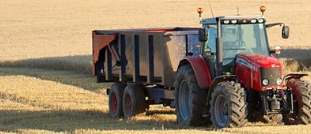Delays to the EU’s Common Agricultural Policy (CAP) new payments system have left cash flows for Scottish farmers “under severe pressure” with around £440 million still outstanding, according to NFU Scotland president Allan Bowie.
In his address to NFU Scotland’s annual general meeting, Bowie urged the Scottish Government to deliver support payments to farmers and crofters.
“The current cashflow crisis — which has a flawed support delivery system at its core — is not just about farmers, but the knock on effect to auxiliary trades and all those who provide farmers with a service,” said Bowie.
“A healthy farming sector is the mainstay of the rural economy and the bedrock of the Scottish food and drink sector — we need the whole industry to work together.
“Twenty months on from the cabinet secretary’s initial statement on CAP implementation, the majority of Scottish farmers still remain completely unaware of when they will receive support payment under the new schemes.
“To date, only a small share of basic payments and greening payments have been made so far and, compared to this time last year, around £440 million is outstanding to farmers.
“That is the hole in the Scottish rural economy that Scottish Government is responsible for and the reason why the wheels have stopped turning in the Scottish countryside.
“We need all businesses to get the majority of their payments in the next month to avoid further damage to family farms and those companies that rely on their business.”
Reforms to the CAP mean the old “single farm payment scheme” was replaced by a new “basic payment scheme” (BPS).
The money is allocated by the Scottish government, but payments have been delayed by problems with the IT system used to allocate the funds, and critics have said the new system is too complex.
Bowie said farmers had done their bit to produce fine Scottish food and drink, and now the Scottish Government needed to do its bit as a matter of urgency.
“Cash flows are under severe pressure, and the worry and stress of not knowing when support streams will start to flow is starting to impact on the health of our hard-working farmers,” said Bowie.
“With only a third of Scottish farmers having received any element of support under new CAP schemes, we need to start seeing movement and delivery before purdah comes into play for May’s Scottish parliamentary elections and the chance to publicly call our politicians to account is lost.
“Initial estimates for the total farm income figure for Scotland in 2015 show a decrease of 15 per cent. This is only the second time this century that incomes have fallen for two consecutive years.
“And, looking at forecast figures across all sectors, it is a challenge to see farm incomes rally in 2016.”
On January 29, the Scottish Government’s rural affairs secretary Richard Lochhead said that “due to the challenge of implementing the biggest CAP reform in a generation” it was taking longer than expected to process applications – and that EU rules expressly prohibited paying out on claims “until they have been fully processed.”
“In this transition year between the old CAP and the new CAP we are having to move to a whole new basis for allocating funds based on area of land, as well as implementing new greening measures and introducing a raft of new schemes to support agriculture,” said Lochhead.
“I fully recognise the importance to farmers of receiving these payments as early as possible within the EU’s payment window of 1st December to June 30th and the Scottish Government is delivering, albeit at a slower pace than we’d all hoped.
“My officials have informed me the extreme complexity of the new CAP means claims are taking longer to process and EU regulations prevent us from issuing payments until all of the necessary checks have been completed …
“My officials are working as hard as possible to make as many first installment payments as we can by the end of March, and the balance of payments soon after …”
